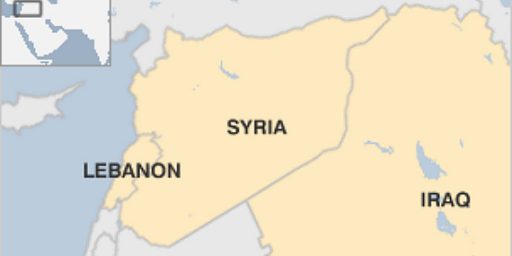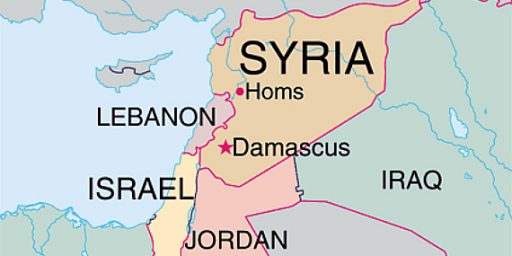U.S. Hints at Penalties for Syria
U.S. Seems Sure of the Hand of Syria, Hinting at Penalties (NYT rss)
The Bush administration, condemning the assassination of the former prime minister, Rafik Hariri, in Lebanon, suggested Monday that Syria was to blame and moved to get a new condemnation of Syria’s domination of Lebanon at the United Nations Security Council. American and European officials also said the administration was studying the possibility of tougher sanctions on Syria, effectively tightening penalties imposed in May, when Washington said the Syrian government had failed to act against militant groups in Israel and against a supply line from Syria to the insurgents in Iraq. “We condemn this brutal attack in the strongest possible terms,” said Scott McClellan, the White House spokesman, adding that the killing was “a terrible reminder that the Lebanese people must be able to pursue their aspirations and determine their own political future free from violence and intimidation and free from Syrian occupation.”
American officials said the killing was an ominous development on two counts: first, because it raised concern that Lebanon could plunge back into the civil war that it suffered throughout the 1980’s, and second, because it underscored growing American impatience with the role played by Syria in the Middle East.
Mr. McClellan and other administration spokesmen said they had no concrete evidence of Syria’s involvement in the killing of Mr. Hariri, a prominent opposition leader and critic of Syria’s role in Lebanon, who died along with at least 11 others when a car bomb blew up next to his motorcade in Beirut. And in fact the Syrian foreign minister, Farouk al-Sharaa, speaking at a news conference in Damascus, also condemned the attack.
But the target of the American criticism was unmistakable, as several officials condemned Syria’s role in Lebanon as part of their comments on the attack. “We’re going to turn up the heat on Syria, that’s for sure,” said a senior State Department official. “It’s been a pretty steady progression of pressure up to now, but I think it’s going to spike in the wake of this event. Even though there’s no evidence to link it to Syria, Syria has, by negligence or design, allowed Lebanon to become destabilized.”
[…]
Western diplomats have sometimes suggested that Syria is “low-hanging fruit” in the campaign against terrorists: a nation that could be punished by further isolation and sanctions because its economy is in poor shape. Iran, by contrast, is awash in oil revenues, and the difficulties of mounting an international campaign against it are becoming increasingly obvious as Europeans call for engagement with Iran rather than confrontation.
Some in the Bush administration have argued for the last two years that Syria’s role has not always been destructive. In particular, some at the State Department and the Central Intelligence Agency have credited Syria with cracking down on some anti-Western militant groups and also with trying at least partly to stop the flow of arms and financing to insurgents in Iraq. That more benign view of Syria has lost favor, however, administration officials say. Earlier this year, Deputy Secretary of State Richard L. Armitage traveled to Syria and gave what a senior official said Monday was a very stern warning to do more to stop the Iraq insurgency and aid to militant anti-Israel groups.
CT Blog’s Evan Kohlman agrees that the Assad regime should be a prime suspect but notes that,
Al-Jazeerah has aired a videotaped claim of responsibility from a previously unknown group calling itself “Al-Nusrat wal Jihad i Bilad al-Shami” (“The Organization for Victory and Jihad in the Levant”). The video takes credit for today’s violent car bombing assassination of former Lebanese Prime Minister Rafik Hariri in the city of Beirut. According to the statement, “For the sake of our Mujahideen brothers in Saudi Arabia … we decided to implement the just execution of those who support this regime… This was a martyrdom operation we carried out … This is the beginning of many martyrdom operations against the infidels and apostates in the Levant.â€
Belmont Club’s Wretchard rounds up other expert analysts and finds no agreement.
Juan Cole shrewdly makes no concrete guess at this point but observes,
Personally, I find the likelihood of the Saudi connection generating al-Qaeda-type violence against him somewhat more plausible than that it came out of local politics, since local politics had been fairly civil in Lebanon.
It is also possible, since al-Hariri was worth $4 billion and had all sorts of shady deals going on even when he was PM, that this assassination had an economic/ mafia-type background that we are not aware of.
CT Blog’s Larry Johnson doesn’t identify a culprit but thinks Syrian geopolitics is at play. He draws a rather ominous conclusion, too:
Today’s bomb blast in Lebanon, which killed former Lebanese Prime Minister Rafiq Hariri, is a harbinger that a peaceful, democratic transition of Governments in the Middle East is a foolish pipe dream. Hariri, aka Fatso, has been a long time pawn of Saudi Arabia and a favorite of both Washington and Paris. His murder comes against the backdrop of increased pressure by the United States and France to force Syria to withdraw its military forces from Lebanon. This car bombing was probably designed to send an unambiguous message to both Lebanese and the international community that Syria will not stand idly by and surrender to pressures from Washington, Paris, and the United Nations. [emphasis added]
Of course, as it relates to whether getting Syria out of Lebanon should be a serious focus of U.S. foreign policy, the question of who killed Hariri is rather moot. Certainly, a direct order by Hassad to kill a foreign diplomat would be added grist for the mill. Still, as I noted yesterday, the Bush Doctrine would seem to demand that we do what we can to secure self-determination for the Lebanese people.
Matt Yglesias illustrates, though, why it will be a tough sell domestically:
And as the White House moves toward trying to build support for some sort of retaliation against Syria, I can’t help but think that I would be 100 percent behind the president in this were I not 100 percent sure that this administration is being run by people who would think nothing of trying to manipulate the country into a military conflict with a middle eastern nation based on flawed, overblown intelligence and misleading presentation of that evidence.
That a longstanding, bipartisan, international consensus existed that Saddam’s regime was building WMD and supporting Islamic terrorists notwithstanding, the “Bush lied to get us into war” meme persists. That the Assad regime has been, along with Iran, the biggest sponsors of international terrorism and has controlled Lebanon since before Matt was born, apparently, becomes less true if Bush says it.




“That a longstanding, bipartisan, international consensus existed that Saddam’s regime was building WMD and supporting Islamic terrorists notwithstanding, the “Bush lied to get us into war” meme persists.”
What will be the leftward criticism of action in Syria, should it become necessary? There’s no proof that Syria is tied to terror? No war for dates? The Lebanese aren’t really all that bad off?
Ironically, turning up the heat on Syria may yet uncover those elusive WMDs.
A vote for bush is a vote for osama
A vote for bush is a vote for osama
Now there’s a new high in witty repartee.